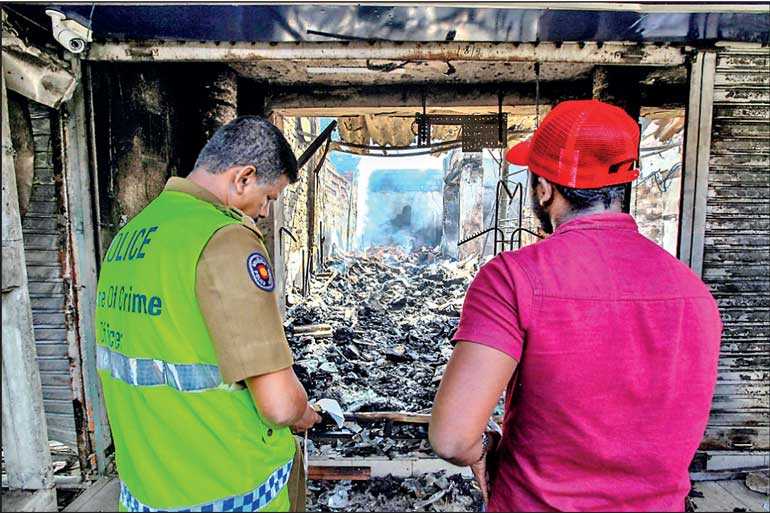Friday Feb 13, 2026
Friday Feb 13, 2026
Friday, 17 May 2019 00:00 - - {{hitsCtrl.values.hits}}

Sri Lanka has encountered a second security failure by allowing the unruly violent mobs to attack Muslim mosques and ordinary Muslim citizens, particularly in the North Western Province. This should have been an ‘anticipated backlash’ to the Easter carnage inflicted by the IS terrorists three weeks before. However, neither the law enforcement agencies nor the political authorities have taken necessary precautions in preventing such an eventuality. 
As a result, at least one person has been killed, over 20 others severely injured and many families have been displaced. The number of attacked and damaged mosques and houses/shops is reported to be nearly 100. The most damaged undoubtedly is the country’s image; and the inter-religious and inter-ethnic relations/harmony of the society.
It appears that still there is no proper coordination between the political authorities and the law enforcement agencies. This is apart from the apparent lack of coordination between various security and law enforcement agencies themselves – the CID, Police, armed forces, etc.
From first to the second
It is just within three weeks that the second security failure has taken place.
The first security failure was most horrendous when nine suicide bombers of extremist Islamic organisations in the country (National Thowheeth Jamath or NTJ, etc.), supported and instigated by the Islamic State (IS) and its leader, Abu Bakr al-Baghdadi, were easily allowed to attack three Christian churches and three tourist hotels on Easter Sunday (4/21), irrespective of relevant authorities having all necessary information. That was an unprovoked terrorist attack without recent connected incidents.
‘Neglect of security of the ordinary citizens’ does appear to be the main cause for that security failure. The Police had made all necessary arrangements to safeguard the security of all political VIPs from the Government to the Opposition.
Three weeks ago the main targets were the Christian churches and their congregations. As a result, over 250 persons were killed and around 500 innocent people were injured. Out of the dead, there were 41 foreign tourists. It appears that the Christian churches were particularly targeted on the instructions from the leaders of the Islamic State (IS), as part of their counter offensive to the real or imagined ‘Crusaders’.
‘The general failure of security and defence’ of course was another underlying reason as revealed by the failure of the Police or the defence authorities to take appropriate action to protect or warn the tourist hotels about the terrorist threat. This is irrespective of the primary importance of tourism to the economy of the country. Even without the help of the Police the hotels could have thwarted the terrorist attacks or protected their guests, if they had been informed.
There are questions whether particularly the general failure of security had emerged as a result of too much of liberalisation in the country. The general atmosphere of this neoliberalism undoubtedly allowed the security personnel and the police to relax and consider everything hunky-dory. Then there were other concerns that if they had acted against people of a particular community, whether that could go against them politically under the present Government.
However, what links the first failure to the second fiasco probably is the general degeneration of security arrangements in the country, the prevalent prejudices among particularly the Police against minority communities, and still lack of coordination between the Police and the military even under the present Emergency regulations.
Delay in taking action
The initial incident this time in Chilaw on 12 May (Sunday morning) was good enough for the Police and the security agencies to take firm action, if they wanted, in preventing what happened thereafter in the whole area and beyond in the North Western (Wayamba) Province, by Monday (13 May).
That Sunday was undoubtedly a reminder of what happened especially in Negombo three weeks before on the Easter Sunday. Communities in Negombo and Chilaw are largely connected through religion and family affiliations. The trigger was a Facebook post by a Muslim businessman in Chilaw saying ‘1 day u will cry,’ against a posting by a Sinhala businessman, apparently criticising the Muslim community.
This was taken as a threat by the Sinhala businessman and along with others, the Muslim business premises was surrounded violently. The Police did intervene. But the intervention undoubtedly was not even. The Muslim businessman was arrested although the posting was a minor threat. Both of the culprits to the Facebook confrontation should have been arrested. But that was not the case for obvious Police biases or fear of political victimisation.
A Police curfew was declared in the Chilaw municipal area immediately in the afternoon which was lifted the following morning. It is alleged that it was during the curfew hours that a mosque and some shops were attacked in the Chilaw town.
Considering the possible eruption of violence in potential other areas like Kurunegala, the curfew should have been imposed in those areas as well. Immediately after the Chilaw incidents, there had been clear movements and rallying of gangs in the Kurunegala town on motorbikes and in vans. The Army should have been deployed immediately without the incompetent and largely-biased Police trying to handle the situation themselves.
The failures
When curfew was imposed in Kurunegala and five other Police areas, it was almost Monday morning. It is alleged that it was during the curfew hours again that most of the mosques and Muslim houses in Kuliyapitiya, Bingiriya, Hettipola and Dummalasuriya were attacked and damaged. Apparently the security was tight in the Kurunegala town, but not in the localities.
When three suspects who were involved or planning attacks were arrested in Kurunegala on Sunday afternoon, the Police had come under immense pressure. It is not clear how far those were political. However the culprits were released giving some ease for those who were further intending trouble making and hate attacks. That is what actually happened on Monday.
A single day of security lapses is good enough for the organised extremists to overturn a situation in a country. This is also what exactly happened on the Easter Sunday.
It was only by Monday evening that island-wide curfew was declared and the Army was effectively brought into curtail the situation. The island-wide curfew was imposed again on Tuesday night and hopefully the situation is now under control. There is evidence however that the Army, like the Police, also were lenient on the mobs, if not supporting them.
It is reported that 74 culprits have now been arrested including the leader of the Mahason Balakaya (Great Vampire Brigade), Amith Weerasinghe, and the leader of the Sinhale Api (We of the Sinhala Land), Dan Priyasad. These organisations should have been banned a long time ago. Those Sinhala extremist organisations were involved in previous attacks against the Muslim community although the present attacks can primarily be by the local extremists.
It is also unfortunate that the Government took over three weeks to ban those terror-related extremist Islamic organisations who were responsible for the Easter Carnage. The relevant gazette was issued only day before (13 May). Of course there are certain procedures to follow, but the steps should have been quicker. These are some reasons why the people were restless and angry, allowing the extremists to capitalise.
Conclusion
Even if the initial Chilaw incidents were unavoidable, there was no room for the escalation of such events in other areas, if proper security measures had been taken promptly. The Army should have been called into service immediately. There can be risks if the Army is involved continuously, but in my opinion these risks are minimal compared to what can happen without their intervention and the country going into continuous violence and chaos.
The reported incident/s (Colombo Telegraph) of at least one or two Army personnel (or a contingent) assisting the mobs in Thummodera should be fully investigated and otherwise the projected credibility of the present Army Commander would be diminished/destroyed.
Ensuring ‘security of civilians’ and the ‘enforcement of law and order’ should be blindfolded irrespective of religion, ethnicity, class, political affiliation or any other distinction. This should be our future goal in recruiting and training of Police and Army personnel.
Apart from what I have said about (1) the degeneration of security arrangements under neo-liberalisation, (2) the apparent prejudices among the Police/Army officers against the minority (Tamil, Muslim and Christian) communities, and (3) the general failure of security coordination between the political authorities and the security authorities, there are various other political interpretations given to the events and lapses. Those are not discussed here.
Most alarming however are the accusations and counter-accusations traded against each other by the Government and the Opposition politicians. Apart from the said accusations, what appears alarming are the unbridled emotions, sensationalism, prejudices, reliance on rumours and expressed hatred. It is apparent that there is something fundamentally wrong with the political culture and psyche of the people and the politicians alike in the country.